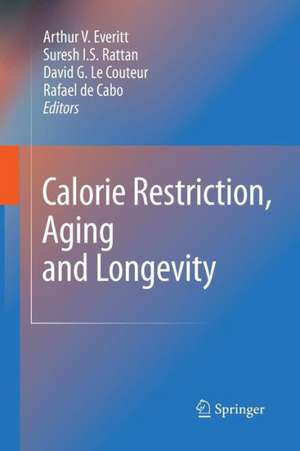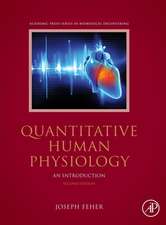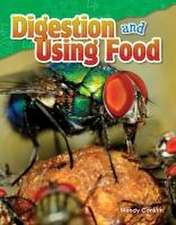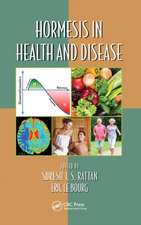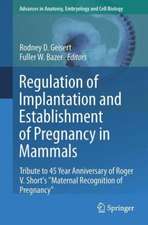Calorie Restriction, Aging and Longevity
Editat de Arthur V. Everitt, Suresh I. S. Rattan, David G. Couteur, Rafael de Caboen Limba Engleză Paperback – 28 oct 2014
Over the last 20 or more years there has been a progressive rise in food intake in many countries of the world, accompanied by a rising incidence of obesity. Thus our increasing food and calorie intake has been linked to the rising incidence of cardiovascular disease and diabetes in early adult life. It is accepted that overeating, accompanied by reduced physical exercise, will lead to more age-related diseases and shortening of life-span. The answer is to reduce our calorie intake, improve our diet, and exercise more. But calorie restriction is extremely difficult to maintain for long periods. How then can we solve this problem?
Edited by a team of highly distinguished academics, this book provides the latest information on the beneficial effects of calorie restriction on health and life-span. This book brings us closer to an understanding at the molecular, cellular and whole organism level of the way forward.
| Toate formatele și edițiile | Preț | Express |
|---|---|---|
| Paperback (1) | 1412.06 lei 6-8 săpt. | |
| SPRINGER NETHERLANDS – 28 oct 2014 | 1412.06 lei 6-8 săpt. | |
| Hardback (1) | 1417.54 lei 6-8 săpt. | |
| SPRINGER NETHERLANDS – 11 mai 2010 | 1417.54 lei 6-8 săpt. |
Preț: 1412.06 lei
Preț vechi: 1486.38 lei
-5% Nou
Puncte Express: 2118
Preț estimativ în valută:
270.23€ • 281.08$ • 223.09£
270.23€ • 281.08$ • 223.09£
Carte tipărită la comandă
Livrare economică 14-28 aprilie
Preluare comenzi: 021 569.72.76
Specificații
ISBN-13: 9789400791152
ISBN-10: 9400791151
Pagini: 340
Ilustrații: XVI, 323 p.
Dimensiuni: 155 x 235 x 18 mm
Greutate: 0.48 kg
Ediția:2010
Editura: SPRINGER NETHERLANDS
Colecția Springer
Locul publicării:Dordrecht, Netherlands
ISBN-10: 9400791151
Pagini: 340
Ilustrații: XVI, 323 p.
Dimensiuni: 155 x 235 x 18 mm
Greutate: 0.48 kg
Ediția:2010
Editura: SPRINGER NETHERLANDS
Colecția Springer
Locul publicării:Dordrecht, Netherlands
Public țintă
ResearchCuprins
Calorie Restriction in Different Species.- History of Caloric Restriction, Aging and Longevity.- Food Intake, Life Style, Aging and Human Longevity.- Okinawa: A Naturally Calorie Restricted Population.- Aging and the Effect of Calorie Restriction in Rhesus Monkeys.- Dietary Restriction and Aging in Drosophila Melanogaster.- Aging and Dietary Restriction: The Yeast Paradigm.- The Nutritional Geometry of Aging.- Biochemical and Metabolic Mechanisms of Calorie Restriction.- Oxidative Stress, Dietary Restriction and Aging.- Calorie Restriction Mimetics and Aging.- Will Calorie Restriction Stave Off Age-Related Brain Dysfunction, Specifically to Learning and Memory? A Review and Critique of the Rodent Literature.- The Aging Liver and the Effects of Long Term Caloric Restriction.- Food Restriction, Hormones, Genes and Aging.- Hormesis as a Mechanism for the Anti-Aging Effects of Calorie Restriction.- Calorie Restriction in the Clinical Setting.- Calorie Restriction and Obesity.- Caloric Restriction and Cardiovascular Disease.- The Effect of Caloric Restriction on Physiological, Psychological and Behavioral Outcomes in Humans: Results from CALERIE.- Calorie Restriction and Cancer: An Update.- Conclusion: Human Calorie Restriction and Anti-aging Therapy.
Textul de pe ultima copertă
Food or calorie restriction has been shown in many short-lived animals and the rhesus monkey to prolong life-span. Life-long nutrition studies are not possible in humans because of their long survival. Studies over two to six years in healthy adult humans have, however, shown that a 20% reduction in food or calorie intake slows many indices of normal and disease-related aging. Thus, it is widely believed that long-term reduction in calorie or food intake will delay the onset of age-related diseases such as heart disease, diabetes and cancer, and so prolong life.
Over the last 20 or more years there has been a progressive rise in food intake in many countries of the world, accompanied by a rising incidence of obesity. Thus our increasing food and calorie intake has been linked to the rising incidence of cardiovascular disease and diabetes in early adult life. It is accepted that overeating, accompanied by reduced physical exercise, will lead to more age-related diseases and shortening of life-span. The answer is to reduce our calorie intake, improve our diet, and exercise more. But calorie restriction is extremely difficult to maintain for long periods. How then can we solve this problem?
Edited by a team of highly distinguished academics, this book provides the latest information on the beneficial effects of calorie restriction on health and life-span. This book brings us closer to an understanding at the molecular, cellular and whole organism level of the way forward.
Over the last 20 or more years there has been a progressive rise in food intake in many countries of the world, accompanied by a rising incidence of obesity. Thus our increasing food and calorie intake has been linked to the rising incidence of cardiovascular disease and diabetes in early adult life. It is accepted that overeating, accompanied by reduced physical exercise, will lead to more age-related diseases and shortening of life-span. The answer is to reduce our calorie intake, improve our diet, and exercise more. But calorie restriction is extremely difficult to maintain for long periods. How then can we solve this problem?
Edited by a team of highly distinguished academics, this book provides the latest information on the beneficial effects of calorie restriction on health and life-span. This book brings us closer to an understanding at the molecular, cellular and whole organism level of the way forward.
Caracteristici
Discusses how the long-term reduction in calorie or food intake will delay the onset of age-related diseases Provides the latest information on health and life-span effects of Calorie Restriction Covers effects on the molecular, cellular and whole organism level Edited by a team of highly distinguished academics
